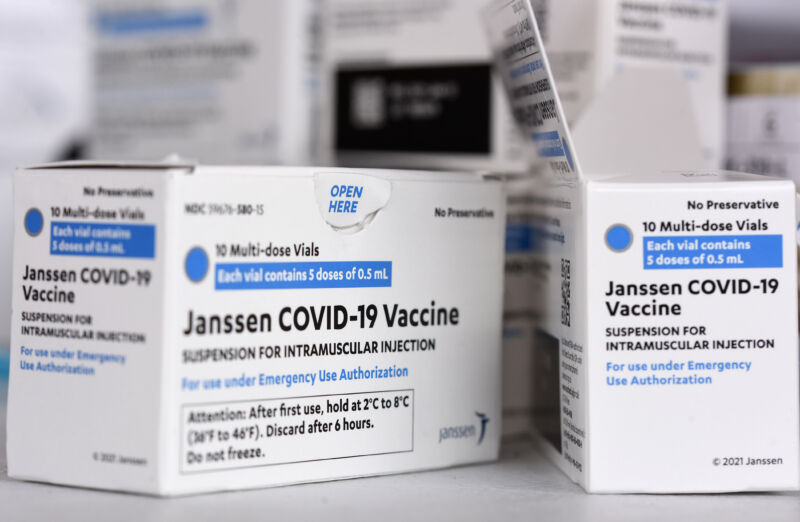

J&J’s COVID vaccine is dead in the US; FDA revokes authorization
source link: https://arstechnica.com/health/2023/06/j-fda-revokes-authorization/
Go to the source link to view the article. You can view the picture content, updated content and better typesetting reading experience. If the link is broken, please click the button below to view the snapshot at that time.

Nail in the coffin —
J&J’s COVID vaccine is dead in the US; FDA revokes authorization
The withdrawal leaves the two mRNA vaccines and the Novavax protein subunit vaccine.
Beth Mole - 6/6/2023, 9:24 PM

The Food and Drug Administration has withdrawn authorization for Johnson & Johnson's COVID-19 vaccine, ending its short-lived but troubled existence amid the pandemic.
In a letter last week, the FDA's top vaccine regulator, Peter Marks, wrote to Janssen Biotech—the Johnson & Johnson-owned, Belgium-based company responsible for the vaccine—saying that the agency was revoking authorization. Marks opened the letter by noting that the withdrawal was at the request of the company.
According to Marks, Janssen's May 22 letter informed the FDA that:
the last lots of the Janssen COVID-19 Vaccine purchased by the United States Government have expired, that there is no demand for new lots of the Janssen COVID-19 Vaccine in the United States, and that Janssen Biotech, Inc does not intend to update the strain composition of this vaccine to address emerging variants.
Last month, the Centers for Disease Control and Prevention noted on its website that the vaccine was no longer available in the US because the remaining government stock expired on May 7, 2023. According to CDC data tracking, about 31.5 million J&J vaccine doses had been delivered to states amid the pandemic, but only around 19 million were administered, leaving the remaining 12.5 million or so to expire.
The beginning of the end for the once-promising single-dose vaccine came just weeks after its FDA authorization on February 27, 2021. On March 13, 2021, the FDA and CDC paused the use of the J&J vaccine out of concern for an extremely rare clotting disorder, which was first noticed with a similar vaccine made by AstraZeneca. Both vaccines used an adenovirus vector-based design, though the AstraZeneca vaccine was never authorized for use in the US. The pause on J&J's vaccine lasted just 11 days, but the damage was done, and demand for the vaccine tumbled, never to recover.
AdvertisementMeanwhile, US production of the vaccine was mired by the scandal surrounding Emergent BioSolutions, a government contractor that ruined tens of millions of J&J COVID-19 vaccine doses due to quality-control problems and contamination. Despite raking in hundreds of millions of dollars from government contracts, Emergent had a history of manufacturing violations.
In December of 2021, the CDC downgraded J&J's vaccine, saying that the mRNA-based vaccines should be the preferred vaccines against COVID-19. And in May of 2022, the FDA limited the use of the vaccine to those ages 18 and older who were unable or unwilling to get an alternative vaccine.
The complete withdrawal this month comes as the FDA prepares to discuss new formulations of COVID-19 vaccines for this fall. The FDA has long held to the idea of updating COVID shots much like annual flu shots—reassessing vaccine formulas in the late spring/early summer in order to prompt manufacturers to have updated formulas ready for rollout in the fall. The agency's vaccine advisory committee will meet on June 15 to discuss the best formula for this fall.
Already, the World Health Organization's vaccine advisory committee has advised that countries this year should switch to monovalent vaccines that target the XBB lineage, the latest omicron sublineage to dominate transmission. In a statement released May 18, WHO advisers recommended that countries ditch the current bivalent formulas—which target both the ancestral SARS-CoV-2 virus and an omicron subvariant—because continuing to target the ancestral strain doesn't seem to boost protection against current strains. Moreover, keeping the ancestral strain in the shots "reduces the concentration of the new target antigen(s) as compared to monovalent vaccines."
The FDA advisers meeting on June 15 will discuss reformulations that will apply to mRNA vaccines made by Pfizer-BioNTech and Moderna. Novavax, which makes a protein-based vaccine available in the US, is also working on an updated COVID-19 shot against XBB strains.
Recommend
About Joyk
Aggregate valuable and interesting links.
Joyk means Joy of geeK